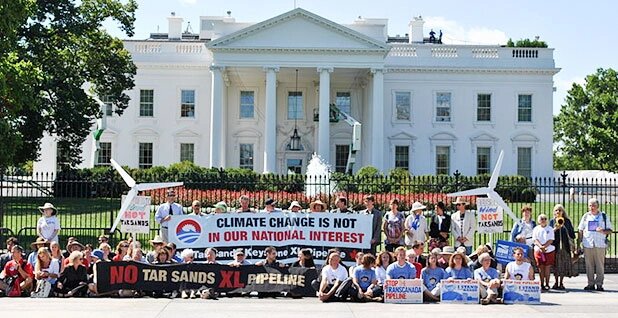The group will keep three U.S. positions open in hopes of reviving operations in the future.

BELÉM, Brazil — Environmental group 350.org, which spearheaded the movement to block the Keystone XL oil pipeline, will “temporarily suspend programming” in the U.S. and other countries amid funding woes, according to a letter obtained by POLITICO.
The move comes as environmental groups have struggled to find their footing and raise money under President Donald Trump, whose threats to investigate left-leaning organizations and rapid-fire dismantling of environmental rules have hamstrung green groups.
The letter to outside organizations from Executive Director Anne Jellema said 350.org had suffered a 25 percent drop in income for its 2025 and 2026 fiscal years, compelling it to halt operations. The group will keep three U.S. staff members in hopes of reviving operations in the future.
“In making these very tough choices, we considered a range of factors, including the political context, the relative need for 350’s work based on the strength of other actors in the ecosystem, the presence or absence of an enabling environment for civil society, and the ability to resource the work needed,” the letter said.
Jellema said the group will preserve its resources over “a smaller number of geographies” where she believes it can still accomplish its goals. The organization has built out its global presence over the years and has personnel on the ground at COP30 in Belém, Brazil.
A spokesperson for 350.org did not immediately respond to a request for comment.
350.org was formed in 2007 and helped recharge the environmental movement after Congress failed to enact a sweeping cap-and-trade law in the early 2010s. The group, whose name refers to the 350 parts per million concentration of carbon dioxide in the atmosphere that was seen as a safer upper limit to keep the planet from overheating, turned the fight over the development of the Keystone XL pipeline into a symbol for climate change. The effort helped generate opposition that ultimately led then-President Barack Obama to deny the permits for the pipeline designed to bring heavy oil from Canada to Texas.
The upstart group that had been led by activist and writer Bill McKibben and Middlebury College students helped popularize the slogan “Keep It in the Ground,” referring to the call to end the extraction of oil, coal and gas that cause climate change.
The group had endured economic hardship over the years, including problems of financial management and several rounds of layoffs that eroded its influence.
“We are moving through these challenging times with our ambition intact, and have immense confidence that we shall rebuild strategically to a full program and team in the US when the political and/or funding environment permits,” Jellema said in the letter.
